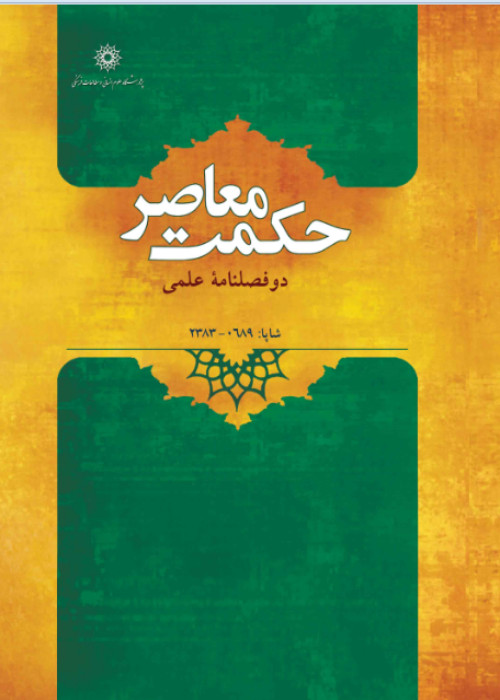Afḍal al-Dīn Kāshānī’s Account of the Lord of Human Species or the Nature of the Rational Soul
The supernatural (malakūtī) origin of things is an immaterial, illuminated, and self-subsistent substance, which Muslim philosophers, particularly Illuminationist philosophers, call the “Lord of Species” (rabb al-nawʿ); that is, archetype. In Illuminationist philosophy, lords of species or lords of talismans (arbāb al-ṭilismāt) are the domineering horizontal lights (al-anwār al-qāhirat al-ʿarḍiyya) or equivalent intellects (al-ʿuqūl al-mutakāfiʾa), which al-Suhrawardī identifies with angels or illuminated essences in Zoroastrianism. Of all the species, the human soul has a supernatural origin or a lord, which is known in Islamic philosophy as the “tenth intellect” (based on how plurality issues forth from unity) and in religious terminology as the “Holy Spirit” (rūḥ al-qudus) or Gabriel. Almost all Muslim philosophers identify the lord of the human species with Gabriel or the Holy Spirit, who mediates God’s grace and is the giver of the forms (wāhib al-ṣuwar).
Statement of the Problem:
Just like other Illuminationist Platonist Muslim philosophers, Afḍal al-Dīn Muḥammad al-Maraqī al-Kāshānī, an Iranian philosopher in the twelfth and thirteenth centuries, believed in two worlds: physical and spiritual. In his view, the physical world is an image of the higher world. He held that particular sensible forms and meanings in this world are mortal, all being images or representations of eternal forms in the intellectual world. On his account, each species in this physical world has a specific (species-related) form as an absolute universal in the non-physical world. The main question of the present article concerns Afḍal al-Dīn Kāshānī’s view of the lord of the human species, given that his philosophy rests upon illuminations, intuitions, and consciousness. Indeed, how does he define the nature of the human soul as supernal origin of the human species? A survey of Afḍal al-Dīn’s philosophical works reveals that his view differs from that of other Muslim philosophers, opening a new path to philosophical discussions of the lord of human species.
Method of Research:
The method of research in the present article is analytic-descriptive based on library studies. We first surveyed the philosophical problem of the “lord of species” in philosophical works before Bābā Afḍal, and then elaborated upon the Illuminationist view of the matter based on al-Suhrawardī’s works. We then accounted for Afḍal al-Dīn Kāshānī’s theories of the spiritual origin of souls in terms of the theory of correspondence between macrocosm and microcosm based on his philosophical works, and then adduced evidence from his philosophical essays to expound his view of the lord of the human species. The contribution of this research is elaboration of the distinction between his view and the views of other Muslim philosophers, which is left unnoticed in other relevant research into Bābā Afḍal’s works. This article considers his view to bring to light the connection between Islamic philosophy and mysticism. For by characterizing Azrael as the lord of the human species, he says that the outcome of the soul is voluntary death or the stage of annihilation.
Afḍal al-Dīn Kāshānī asserts that the soul is pre-eternal, having an intellectual origin that counts as the director and trainer (lord) of the soul. Afḍal al-Dīn’s angelology is closely tied to his principle of the correspondence between macrocosm and microcosm. Accordingly, he matches the four archangels in macrocosm (Michael, Israfil, Azrael, and Gabriel) with the four souls within humans (microcosm); that is, the supernal soul, the retaining soul (al-nafs al-ḥāfiẓa), the inscribing soul (al-nafs al-kātiba), and the rational soul (al-nafs al-nāṭiqa). Contrary to other philosophers who identify the lord of the human species with Gabriel, he identifies the nature of the human soul or the lord of human species with Azrael, the angel of death.Bābā Afḍal believes that forms and meanings are separate (albeit mutually entailing) parts, where the former belongs to the physical world and the latter to the spiritual world. He holds that to separate form from meaning is indeed to separate physical beings from spiritual beings. The world of forms is the world of annihilation and mortality, and the world of meaning is the world of immortality and eternity. On this theory, he concludes that Azrael is the true nature of the soul in that the human soul has the function of receiving things and taking the spirit of meanings from templates of forms, just as Azrael takes life from things. The human soul is mainly characterized by knowing things or by consciousness, which is indeed to take and receive the life of things—that is, their meanings and truths—from their forms.
A survey of Afḍal al-Dīn Kāshānī’s works shows that, on the problem of the lord of human species, he offers a view distinct from the views of Peripatetic and Illuminationist philosophers before him. Contrary to other philosophers who identify the lord of human species with Gabriel or the tenth intellect from among all the angels or intellects, he identifies it with the angel of death, Azrael, as the origin and true nature of the rational soul, based on form-meaning bifurcation. He maintains that, having arrived at self-consciousness by virtue of turning away from forms and turning to meanings, the human soul observes truths, and by shedding the light of meaning on forms, the concealed will be disclosed to it.
- حق عضویت دریافتی صرف حمایت از نشریات عضو و نگهداری، تکمیل و توسعه مگیران میشود.
- پرداخت حق اشتراک و دانلود مقالات اجازه بازنشر آن در سایر رسانههای چاپی و دیجیتال را به کاربر نمیدهد.



